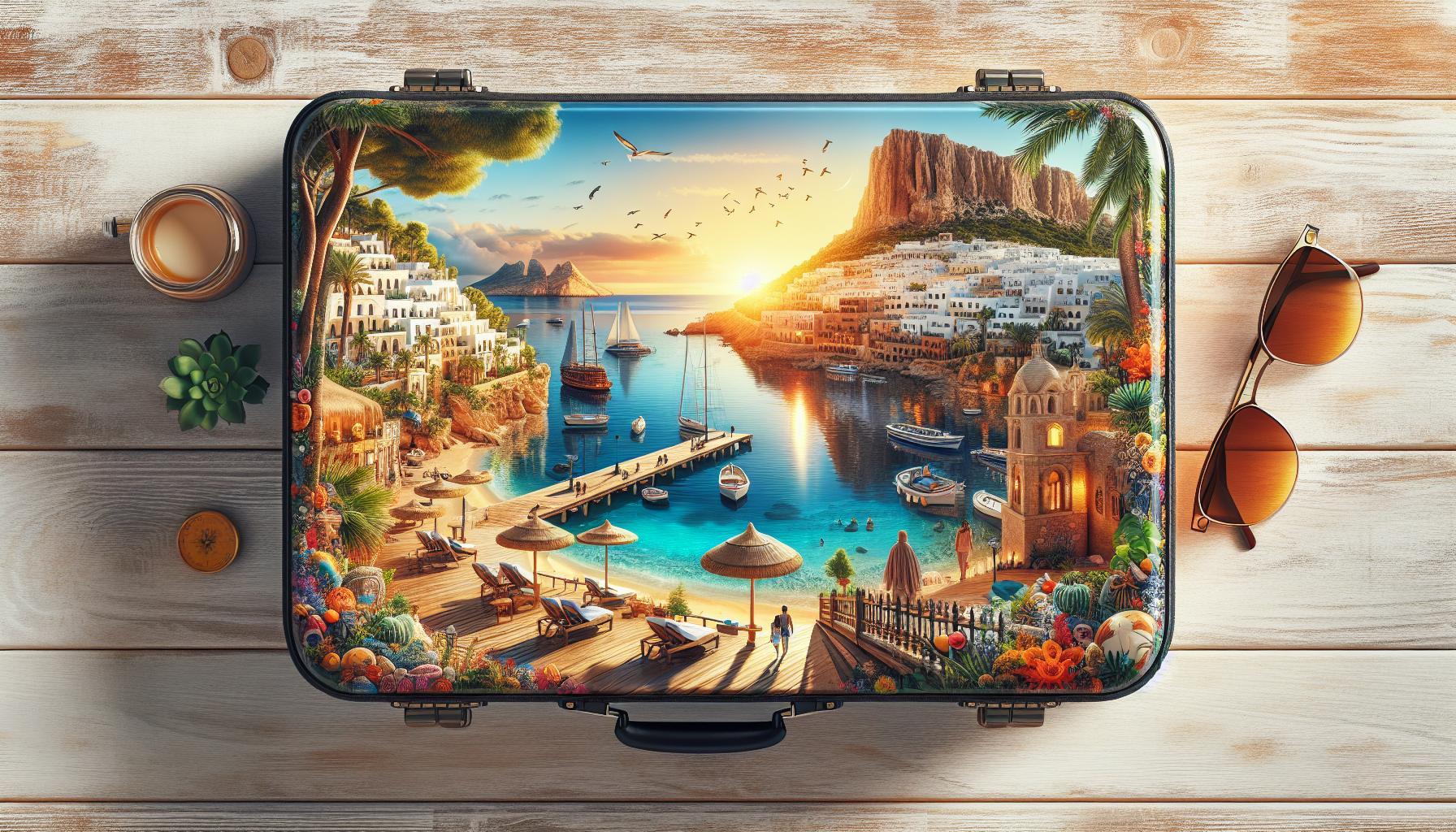Struggling to pronounce the name of the famous Spanish island correctly? Mastering the pronunciation of Ibiza is essential for travelers and enthusiasts who want to experience the local culture fully. This guide will help you say it right, ensuring you blend in seamlessly weather you’re discussing party hotspots or scenic beaches.
The magic of Ibiza: More Than Just a Beautiful Name
Amidst the sun-soaked shores and vibrant nightlife,Ibiza evokes a sense of magic that goes beyond its enchanting landscape and festive allure.This Mediterranean island has carved a niche as a cultural and musical epicenter, attracting visitors from all corners of the globe. But to truly appreciate its essence, knowing how to pronounce Ibiza correctly encapsulates the importance of connecting with the local culture.Many aficionados of the island use the pronunciation “ee-bee-tha,” yet a more authentic version harkens back to its Catalan roots, “eee-vee-sa” (Eivissa). Mastering these nuances not only enhances your travel experience but also respects the island’s heritage.
The journey through Ibiza is replete with contrasts—famed for its electrifying club scene, it also offers serene environments where one can escape the hustle and bustle. As you explore ibiza, try immersing yourself in local traditions by visiting artisan markets in the quaint villages or enjoying a sunset at Café del Mar. Each experience allows you to savor the slower, more deliberate pace of island life, away from the frenetic energy of nightclubs.Here, you can indulge in local gastronomy, embrace unique customs, and mingle with warm-hearted locals—each interaction enhanced by your efforts to pronounce Ibiza authentically.
To truly encapsulate the spirit of Ibiza, consider these engaging activities that can deepen your connection to the island:
- Attend local festivals: experience the island’s rich cultural fabric during conventional celebrations like the “Fiesta de la Tierra.”
- Join a yoga retreat: Focus on wellness in one of the island’s serene locations to balance the nightlife with rejuvenation.
- Take a guided tour: Learn about Ibiza’s history and traditions with local guides who can share secrets beyond popular tourist spots.
With its rhythmic pulse and vibrant colors, Ibiza offers an immersive experience that beckons to be explored beyond the surface. Entering into the heart of its culture, fluently pronouncing its name like a local enhances your journey, inviting deeper connections and richer memories. Whether you’re sipping a cocktail at a beach bar or dancing under the stars, saying “Eivissa” is just one step towards unlocking the magic this island holds.
Understanding the Local Dialect: The Sounds of Ibiza
To truly immerse yourself in the vibrant culture of Ibiza, understanding the local dialect is essential. in this Balearic paradise,two official languages coexist: Spanish (also known as Castilian) and Catalan. The local variant of Catalan spoken in Ibiza is called Eivissenc, a unique dialect that reflects the island’s rich history and diverse influences. As you wander through the streets of Ibiza, you will encounter both languages, with around 80% of the island’s residents being bilingual.
Local Pronunciation Insights
the pronunciation of place names can sometimes be tricky for visitors. As an exmaple,“Ibiza” is often mispronounced,leading to a slight disconnect with the locals. The correct way to say it in English, which aligns with local pronunciation, involves saying “ee-BEE-tha” in Spanish or “ee-BEE-tsa” in Catalan. This subtle difference not only demonstrates respect for the culture but also enhances your interactions while exploring the island.
Characteristics of Eivissenc
Eivissenc, the local dialect, has various phonetic and lexical characteristics that might be unfamiliar but are wonderfully distinct. Here are a few key features:
- Vowel Sounds: Eivissenc features a variety of vowel sounds that may differ from standard Catalan.
- Lexical Variations: Certain words and phrases are unique to Ibiza, showcasing its local culture and traditions.
- Influence from Other Languages: Historical influences from neighboring Mediterranean cultures can be seen in the dialect.
Understanding these elements not only aids in correct pronunciation but also enhances your recognition of the local history and social dynamics.For anyone keen on fully embracing life on the island, learning a few basic phrases in Eivissenc can enrich your experience, making it more authentic and enjoyable.
A Practical Framework for Learning
incorporating Eivissenc into your interactions can begin with simple greetings or phrases:
| English Phrase | Eivissenc |
|---|---|
| Hello | Hola |
| Thank you | Gràcies |
| Goodbye | Adéu |
By actively using these phrases, not only will you feel more connected to the local community, but you’ll also find that your efforts are often met with warmth and appreciation. By grasping the essence of how to pronounce Ibiza correctly and understanding the local dialect, you elevate your travel experience, allowing you to engage more deeply with the people and the surroundings of this enchanting island.
Breaking It down: Phonetics and Syllables of “Ibiza”
The vibrant island of Ibiza, renowned for its nightlife and stunning beaches, often confuses non-Spanish speakers when it comes to pronunciation. The correct way to pronounce “Ibiza” can differ dramatically based on geographic and cultural contexts. Understanding its phonetic breakdown is crucial for anyone wanting to sound more like a local.
To start, Ibiza can be phonetically expressed as /ɪˈbiːθə/ in English. This reflects the most common English pronunciation, which may be somewhat anglicized compared to the original Spanish. In Spanish, “Ibiza” is pronounced as /iˈβiθa/, where the ‘I’ is a clear ‘ee’ sound, the ‘b’ is pronounced softly, akin to an English ‘b’, and the ‘z’ in Spain sounds more like a ‘th’ in English. This distinction highlights how crucial it is indeed to adjust your pronunciation based on the language you are using.
The island’s name consists of three syllables, making it easy to break down for practice. Here’s a simple guide to the syllables of “Ibiza”:
| Syllable | Pronunciation |
|---|---|
| Ib | eeb |
| i | thee |
| za | thah |
By focusing on these individual sounds, learners can practice transitioning smoothly from one syllable to the next. To sound more authentic, try to mimic native Spanish speakers, as they emphasize the first syllable and maintain a fluid connection between them. Engaging with native audio resources, such as pronunciation guides and videos, can significantly help you master the art of saying “Ibiza” correctly, making sure that you not only say it correctly but also capture the essence of its cultural significance.
Common Mispronunciations: What to Avoid When Saying Ibiza
Despite its fame as a top party destination, many people continue to mispronounce Ibiza. The correct pronunciation is not as intuitive as it might seem, and saying it wrong can leave a less-than-great impression. When addressing this beautiful Balearic island known for its vibrant nightlife and stunning beaches, it’s essential to get it right.
One common misunderstanding stems from the tendency of English speakers to pronounce it as “ih-bee-zuh.” Though, the prevailing local pronunciation is actually closer to either ee-vee-thah or ee-vee-sa [[2]]. This difference highlights the significance of local dialects,and using the correct pronunciation can enrich interaction and show respect for the culture.
To avoid mispronunciation, keep the following tips in mind:
- Listen Actively: Pay attention to how locals pronounce Ibiza when you visit or hear it in media.
- Practice Makes Perfect: Rehearse the pronunciation (ee-vee-thah) in front of a mirror or with friends to build confidence.
- Use Phonetic guides: Familiarize yourself with phonetic spellings to align your speech with native pronunciations.
By mastering the correct way to say Ibiza, you not only enhance your travel experiences but also demonstrate cultural awareness that can resonate positively with locals.Whether you’re discussing your trip or planning a visit, remember: saying Ibiza right is an effortless yet impactful way to connect with the island’s heritage.
Insider Tips: Practicing Pronunciation Like a Local
Practicing pronunciation effectively can truly elevate your language skills, transforming your speech into something that sounds more authentic and local. When it comes to learning how to pronounce “Ibiza” correctly in English, the journey begins with understanding the phonetic nuances that will help you convey its charm like a native. Notably, “Ibiza” is often mispronounced by English speakers, but with focused practice and insider tips, you can master it effortlessly.
To sound like a local, start by immersing yourself in the local pronunciation. Listen to audio clips from native speakers, which can be found on various language learning platforms. This exposure will train your ear to catch the subtle differences in sound. As an example, the proper pronunciation of “Ibiza” phonetically aligns closer to “ee-BEE-tha” rather than “ih-BEE-zuh.” Establish a routine where you practice saying the word after listening to it in context, allowing repetition to build muscle memory.
Key Techniques for Effective Pronunciation Practice
- Breathing Exercises: Proper breathing is essential when it comes to phonetics. Practice deep breathing techniques to control your airflow as you speak.
- Mimic Native Speakers: Use platforms with audio resources to listen and then mimic the pronunciation of “Ibiza.” This method reinforces your learning.
- Record Yourself: Hearing your own pronunciation can reveal areas for betterment. Record yourself saying “Ibiza” and compare it to native pronunciations.
- Engage with Language Communities: Join language exchange groups where you can practice with others. Engaging in conversation will build your confidence.
By incorporating regular practice into your daily routine, you can notice important improvements in how you articulate not just “ibiza,” but other challenging words as well. Remember that sounding local is not just about pronunciation; it’s also about embracing the rhythm and tone of the conversation. Take every possibility to practice, and soon, you’ll be pronouncing “Ibiza” like a true local, enhancing not only your linguistic skills but also your cultural connection.
From Party to paradise: The Importance of Nailing the Name
Visiting Ibiza isn’t just about beautiful beaches and vibrant nightlife; it’s also an experience steeped in culture and identity.One of the first steps to truly immersing yourself in the local charm is mastering the pronunciation of the island’s name. While many people casually refer to Ibiza as “eye-bee-za,” the correct pronunciation is closer to “ee-BEE-tha,” reflecting the Spanish influence on its sound. Understanding and using the correct pronunciation can not only enhance your travel experience but also forge deeper connections with the locals.
The Power of Pronunciation
Getting the name right serves more than just linguistic accuracy; it shows respect for the culture and tradition of the island. Locals often appreciate when visitors make an effort to speak their language correctly, even something as simple as the name. Mispronouncing Ibiza can lead to amused smiles or even mild annoyance among residents, which could detract from the overall experience. Being able to confidently say “ee-BEE-tha” signifies your acknowledgment of the island’s heritage, setting a positive tone for your interactions.
Tips for Nail the Pronunciation
To help you nail the pronunciation, consider these practical steps:
- Listen and Imitate: Utilize audio resources, such as those available on pronunciation websites and YouTube videos, to hear native pronunciations and practice mimicking the sounds.
- Phonetic Practice: Break the word down into syllables. Practice saying “ee” for the first syllable, followed by a strong “BEE,” and conclude with “tha” spoken softly.
- Use in Context: Integrate the pronunciation into conversations about your travel plans, enhancing the retention of the correct name through practical application.
With these techniques, you’ll not only sound more like a local, but you’ll also enrich your understanding of Ibiza’s vibrant culture.Remember,every time you say “ee-BEE-tha,” you’re not just referring to a destination; you’re acknowledging a piece of history and a way of life cherished by many.
How Pronunciation Connects You to ibiza’s Culture and community
Mastering the correct pronunciation of Ibiza not only enhances your communication but also serves as a bridge to its vibrant culture and community. The island, renowned for its stunning beaches and lively nightlife, carries a rich history and local identity that is resonant in its name. By saying “Ibiza” correctly—pronounced as “ee-BEE-tha” in Spanish—you demonstrate respect for the language and the people of the region, fostering a deeper connection with the local community.
When you arrive on the island or engage with those from Ibiza,your effort to pronounce it like a local can pave the way for richer interactions. Locals appreciate when visitors take the time to learn and respect their language, as it shows an understanding of their culture. You might find that a simple greeting like “Hola,¿Cómo estás?” followed by the correct pronunciation of Ibiza can open doors to conversations about favorite local spots,traditions,or even invite locals to share lesser-known stories and insights about the island.
Understanding the nuances of pronunciation reflects an acknowledgment of Ibiza’s diverse cultural heritage,influenced by various civilizations over centuries.This appreciation can manifest itself not just in speech but also in the way you engage with the island’s customs, food, and music. For instance, discussing local cuisine, like “pa amb oli” or “sofrit pagès,” while accurately pronouncing Ibiza, positions you as a more informed and connected traveler.
To help you further integrate this understanding into your visit, here are a few practical tips for engaging with the culture:
- Practice Locally: Try speaking with locals at restaurants or shops and use the correct pronunciation.
- Listen and Repeat: Utilize resources like pronunciation videos and audio clips to refine your accent before your trip.
- Cultural Immersion: Attend local events or festivals where you can interact with residents, such as the famous Ibiza Medieval Market.
By choosing to pronounce Ibiza correctly, you’re not just adhering to linguistic accuracy; you’re embracing the essence of the island’s identity and ensuring a more memorable experience within its welcoming community.
Exploring the Island: How Saying “Ibiza” Right Enriches Your Experience
When visiting the vibrant island of Ibiza,the experience goes beyond just the sun-soaked beaches and pulsating nightlife; it extends to how you connect with the local culture. An essential aspect of this connection is mastering the pronunciation of the island’s name. Understanding the correct way to say “Ibiza” not only enhances your interactions with locals but also shows respect for their language and culture.Rather than simply saying “Ibiza” as many English speakers might, the intriguing pronunciation “Eivissa” (pronounced “eee-vee-sa”) offers a glimpse into Ibiza’s rich catalan heritage, which can enrich your travel experience significantly.
### Embrace Local Culture through Language
There’s a certain camaraderie that comes from speaking a language correctly, even if it’s just the name of the place you’re visiting. By saying “Eivissa” instead of the anglicized version, you can create a friendlier atmosphere when meeting locals, whether at a bustling market or a cozy taverna. This small adjustment can lead to more genuine interactions, as people often appreciate the effort made by tourists to engage with their culture. Consider starting conversations with local shop vendors or restaurant staff by referring to the island as Eivissa; it’s a conversation starter that can pave the way for memories and stories beyond the typical tourist experience.
### Practical Tips for Pronunciation
For those unfamiliar with the Catalan language, here are some practical tips to refine your pronunciation of Ibiza:
- Break it down: Divide the word into syllables: eee – vee – sa. This method can help you remember and articulate it correctly.
- Listen and repeat: Use resources like YouTube videos to hear the pronunciation from native speakers. This auditory practice is crucial for mastering the nuances of pronunciation [[2](https://www.youtube.com/watch?v=4wfiy5xeGHE)].
- Practice with locals: If you have the opportunity, practice saying the name when interacting with residents.This not only helps with pronunciation but also deepens your engagement with their culture.
### why Pronunciation Matters
Mispronouncing a local name may seem trivial, but language shapes identity and community. By correctly pronouncing Ibiza as “Eivissa,” you acknowledge the island’s multicultural roots, which can lead to even deeper conversations about its history and traditions. In this beautiful corner of the Mediterranean, where a blend of music, art, and cuisine flourishes, connecting over language can enhance your journey. Engaging with locals in this way often results in unique experiences—be it discovering hidden gems off the beaten path or being recommended local events that you would otherwise miss.
Ultimately, saying “Eivissa” correctly can transform your visits from mere sightseeing excursions into meaningful escapades. your efforts to respect and learn the local vernacular will resonate deeply with the island’s residents, possibly opening doors to enriching encounters that enhance your time on this stunning island.
Faq
How to pronounce Ibiza in English: Say It Right Like a Local?
the correct pronunciation of Ibiza in English is typically “ee-BEE-tha,” particularly among locals and Spaniards. This reflects the *Castilian Spanish* influence in the region. However,English speakers often say “ih-BEE-zuh.”
While visiting Ibiza, you might notice that locals prefer the Catalan pronunciation “Eivissa,” pronounced as “eee-vee-sa.” Despite this, saying “ee-BEE-tha” will resonate well with residents, making you sound more familiar and pleasant while exploring the island.
What is the origin of the pronunciation variation of Ibiza?
The pronunciation variations of Ibiza stem from its rich cultural history and the influence of both *Catalan* and *Castilian Spanish*. In Catalan,it’s called “Eivissa,” while the Castilian pronunciation is “Ibiza,” pronounced “ee-BEE-tha.”
Each pronunciation reflects different linguistic roots, making it essential for visitors to understand these to connect with locals.Recognizing the *linguistic diversity* adds depth to your experience on this picturesque island.
Why does Ibiza have different pronunciations?
Ibiza has different pronunciations due to its dual influences from Catalan and Castilian Spanish. Locals often use “Eivissa,” while tourists may favor “Ibiza” or its variations. Both pronunciations are correct depending on context.
Understanding these nuances allows for better communication with residents and a deeper appreciation of the island’s culture. embracing local pronunciation enhances your experience as you navigate through Ibiza’s vibrant streets and enjoy its renowned nightlife.
Can I use English pronunciations when speaking about Ibiza?
Yes, you can use English pronunciations when discussing Ibiza. Many English speakers say “ih-BEE-zuh,” but using “ee-BEE-tha” can show respect for the local culture and make interactions smoother.
Being mindful of pronunciation can enrich your trip. Locals appreciate when you try, even if you mix it up. Whether you’re at a beach club or a local restaurant, a little effort goes a long way in connecting with the island’s charming community.
what are common misconceptions about how to pronounce Ibiza?
A common misconception is that the pronunciation of Ibiza is universally “ih-BEE-zuh.” In reality, many locals prefer “ee-BEE-tha,” reflecting regional dialects.
Another misconception is overlooking the role of Catalan culture in Ibiza. It’s important to recognize that “eivissa” is the *original* name, offering insight into the island’s heritage. Understanding these differences will enrich your travel experience and deepen your connection with the island.
How does pronunciation affect my experience in Ibiza?
The way you pronounce Ibiza can influence your experience significantly.Using the local pronunciation, “ee-BEE-tha,” can open doors to friendlier interactions with locals.
Whether you’re ordering at a café or chatting with new friends at a party,familiarizing yourself with local pronunciations shows your interest and respect for the culture. This connection can enhance your enjoyment of the vibrant Ibizan lifestyle.
where can I learn more about Ibiza’s culture and pronunciation?
For an in-depth look into Ibiza’s culture and pronunciation,refer to local travel guides or blogs focused on Ibiza like A Backpacker’s World or Bustle. They frequently enough provide insights into local customs and language.
Engaging with local resources not only improves your pronunciation but also enriches your overall travel experience.Immerse yourself fully to explore both the *famous* and *hidden* sides of Ibiza!
To Conclude
As you embark on your journey to Ibiza, mastering the pronunciation of its name is just the beginning of an unforgettable adventure. With its vibrant nightlife, stunning sunsets over the Mediterranean, and hidden coves waiting to be explored, Ibiza offers a kaleidoscope of experiences for every traveler. Whether you’re dancing at a world-renowned club or enjoying a serene moment on a quiet beach,saying “Ibiza” with confidence will enhance your connection to this magical island. So, next time you’re chatting with fellow travelers or locals, let your well-pronounced “Ibiza” open the door to shared stories and insider tips. Dive into Ibiza’s culture, whether it be savoring local delicacies or exploring its rich history, and embrace the warmth of its community. Your adventure awaits—so go forth, say it right, and let the enchanting spirit of Ibiza inspire you at every turn!









